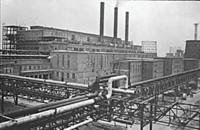Advertisement
Grab your lab coat. Let's get started
Welcome!
Welcome!
Create an account below to get 6 C&EN articles per month, receive newsletters and more - all free.
It seems this is your first time logging in online. Please enter the following information to continue.
As an ACS member you automatically get access to this site. All we need is few more details to create your reading experience.
Not you? Sign in with a different account.
Not you? Sign in with a different account.
ERROR 1
ERROR 1
ERROR 2
ERROR 2
ERROR 2
ERROR 2
ERROR 2
Password and Confirm password must match.
If you have an ACS member number, please enter it here so we can link this account to your membership. (optional)
ERROR 2
ACS values your privacy. By submitting your information, you are gaining access to C&EN and subscribing to our weekly newsletter. We use the information you provide to make your reading experience better, and we will never sell your data to third party members.
Policy
Society Addresses Its Difficult Past
by Sarah Everts
March 3, 2008
| A version of this story appeared in
Volume 86, Issue 9
Although it was founded in 1948, the Max Planck Society (MPS) is a reincarnation of the similarly organized Kaiser Wilhelm Society (KWS), which was established in 1911. At the end of World War II, most of the Allied forces wanted to close down KWS because it had supported the Nazi war effort and because some scientists in the society had been active in some of the Nazis' most despicable science. In addition, the society's name was linked to Germany's imperialist monarchs.
But the British opposed the dissolution of Germany's top science society. They decided KWS needed a new face. And so, three years after the war ended, MPS was born in the British sector of postwar Germany, with the recently deceased Max Planck as its namesake.
Planck had never been a Nazi party member, he was not an anti-Semite, and his son had been murdered by the Nazis for being associated with a group that tried to assassinate Hitler. He was also a Nobel Laureate and had devoted decades to bolstering German science, for example, by starting several KWS research institutes. After the war, this combination of characteristics made many think that Planck was the right sort of face for Germany's new premier research society.
Planck is still often called a man of great integrity, and many of his contributions to German science at the very beginning of the 20th century support this acclaim. However, in the book, "Dilemmas of an Upright Man," his biographer, J. L. Heilbron, reveals that Planck was also a conservative man who believed in preserving German institutions of science at any cost.
Planck seemed to believe that working with the system to achieve your goals was better than fighting it. For example, even though Planck protested the firing of Jewish scientists when he met with Hitler, it did not stop Planck from later implementing that same policy. During the Third Reich, Planck stopped referring to the work of Jewish scientists, even of his close friend Albert Einstein, in public talks.
These are just two reasons that some modern science historians, including Ute Deichmann of the University of Cologne, argue that Planck should have used his considerable influence in Berlin to fight the powers-that-be. Instead, Planck seemed to "subordinate [himself] to the regime almost without protest," she writes.
Going along with the system did not help Planck maintain control over the scientific institutions so important to him. The Nazis cut the aging Planck out of scientific administration by the end of WWII.
When MPS was formed, the society welcomed back many of the people who had been actively involved in the former KWS, including some who had been intimately involved in Nazi politics.
For decades, it was taboo to discuss the links between the Third Reich, KWS, and MPS. The Max Planck Institutes were so important for reestablishing science in Germany after the war that few wanted to touch their problematic past, notes Wolfgang Schieder, an emeritus historian at the University of Cologne. Furthermore, some important documents were stored behind the Iron Curtain.
Finally, in the late 1990s, Hubert Markl, the then-president of MPS, created a commission of independent historians to sort out the past. "It was high time to act," Markl explains. "It was necessary to do it [as soon as possible] in order to still reach the survivors of the Nazi terror."
In 2001, as the commission announced details of the society's difficult past, then-president Markl made an official apology to the Nazi victims on behalf of MPS.
A 16-volume series, filling 10,000 pages, has been published in German that covers the results of the MPS commission's historical research. An English compendium to be published by Cambridge University Press is in preparation.



Join the conversation
Contact the reporter
Submit a Letter to the Editor for publication
Engage with us on Twitter